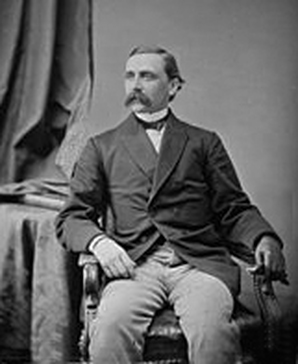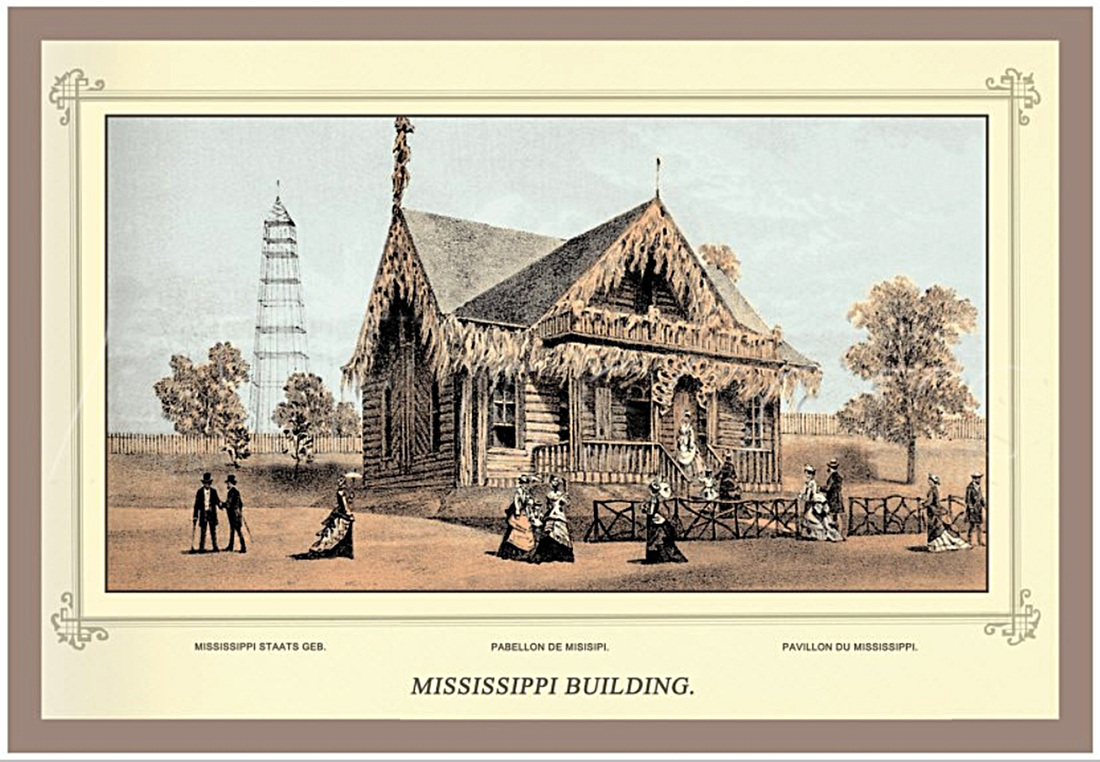Mississippi timber, Centennial 1876, and the port of Gulfport
The United States celebrated its 100th birthday with the Centennial Exhibition of 1876, and Mississippi was represented by a log cabin made from 116 varieties of wood found within its borders. The deep South, still reeling in post-Civil War reconstruction, had little ambition to take part in a 'Union' event. However, the 'Union' appointed governor of Mississippi, General Adelbert Ames, saw the exposition as a prime opportunity for Mississippi to open markets for its most abundant natural resource. And, the national exposure did attract wealthy industrialists who saw the potential for profit… and a way to get the timber out (the steam engine)… and get to market (a deep water port).
 Governor Adelbert Ames
Governor Adelbert Ames
How a Carpetbagger Governor promoted the Timber Industry through Mississippi’s participation in the 1876 Centennial Celebration
Mississippi’s participation in the 1876 Centennial celebration may well be attributed to Adelbert Ames who has been much maligned in Mississippi history as a carpetbagger.
In 1868 Congress appointed War Hero and Medal of Honor holder, General Adelbert Ames, the provisional Governor of Mississippi. His command included the Military District of Mississippi and Arkansas. He was elected governor in 1873 for a second term, and it was in this position that he promoted the entry of both Mississippi and Arkansas in the 1876 Centennial Celebration.
The Republican controlled legislature passed a bill making Ames head of the Centennial committee with authority to appoint all the members. They decided that a modest log cabin constructed entirely from Mississippi’s vast timber resources would be the best way to promote that industry.
As the Federal occupation troops were being withdrawn from the state, the Black and Tan Republican legislature was ousted by white Democrats who immediately threatened Ames with impeachment. They replaced Ames as chairman of the Centennial Committee with the speaker of the house, and fired his committee members. However, they were too late to stop Mississippi’s participation in the Centennial Exposition. They turned back what was left of the appropriated $5,000, and later took credit for the participation in the national exhibit when it was deemed a success.
General Adelbert Ames left an enduring legacy by leading Mississippi out of post-war reconstruction, and into participating in our country's first Centennial Celebration in 1876 that exposed Mississippi timber to a world market.
Mississippi’s participation in the 1876 Centennial celebration may well be attributed to Adelbert Ames who has been much maligned in Mississippi history as a carpetbagger.
In 1868 Congress appointed War Hero and Medal of Honor holder, General Adelbert Ames, the provisional Governor of Mississippi. His command included the Military District of Mississippi and Arkansas. He was elected governor in 1873 for a second term, and it was in this position that he promoted the entry of both Mississippi and Arkansas in the 1876 Centennial Celebration.
The Republican controlled legislature passed a bill making Ames head of the Centennial committee with authority to appoint all the members. They decided that a modest log cabin constructed entirely from Mississippi’s vast timber resources would be the best way to promote that industry.
As the Federal occupation troops were being withdrawn from the state, the Black and Tan Republican legislature was ousted by white Democrats who immediately threatened Ames with impeachment. They replaced Ames as chairman of the Centennial Committee with the speaker of the house, and fired his committee members. However, they were too late to stop Mississippi’s participation in the Centennial Exposition. They turned back what was left of the appropriated $5,000, and later took credit for the participation in the national exhibit when it was deemed a success.
General Adelbert Ames left an enduring legacy by leading Mississippi out of post-war reconstruction, and into participating in our country's first Centennial Celebration in 1876 that exposed Mississippi timber to a world market.


